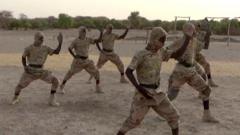Daniella Weiss, labeled the "godmother" of Israel's settler movement, faces UK sanctions aimed at addressing violence against Palestinian communities, prompting a notable response from Israeli officials.
UK Imposes Sanctions on Key Israeli Settler Leader Daniella Weiss

UK Imposes Sanctions on Key Israeli Settler Leader Daniella Weiss
UK Foreign Secretary David Lammy announces sanctions against Daniella Weiss, a prominent figure in the Israeli settler movement, amidst ongoing tensions in Gaza.
The UK government has imposed sanctions on Daniella Weiss, a prominent Israeli settler leader, in a move highlighted by Foreign Secretary David Lammy. Weiss, recognized as the "godmother" of the Israeli settler movement, has played a pivotal role in the establishment of Jewish settlements in the West Bank and East Jerusalem. The recent sanctions are part of a broader UK strategy to hold extremist settlers accountable as Palestinian communities endure ongoing violence and intimidation.
Weiss, 79, heads the radical organization Nachala, which has also been sanctioned. According to the sanctions document, her actions have included "threatening, perpetrating, promoting and supporting aggression and violence against Palestinian individuals." In response to the sanctions, Weiss expressed a readiness from dozens of families to commence immediate settlement in Gaza, alongside promoting the idea of displacement of Gaza's Arab population.
An Israeli Foreign Ministry spokesperson condemned the sanctions as "unjustified and regrettable," signaling the Israeli government’s discontent with the UK's actions. Weiss was recently showcased in Louis Theroux's documentary "The Settlers," where she reiterated her controversial views on settlement policies.
The UK sanctions extend to other individuals and organizations associated with the settler movement, including Zohar Sabah and Harel David Libi, as well as two illegal settler outposts and Libi Construction and Infrastructure LTD. Lammy emphasized the need for the Israeli government to intervene, as their inaction threatens both Palestinian communities and the viability of a two-state solution.
Additionally, the UK announced a halt to free trade negotiations with Israel citing the current Israeli government's policies in the West Bank and Gaza. An Israeli Foreign Ministry spokesperson reacted, suggesting that Britain's political motivations could lead to economic repercussions. This development follows a joint statement from leaders of the UK, France, and Canada urging Israel to cease military operations and allow humanitarian aid into Gaza.
Currently, Israel has agreed to permit minimal food aid into Gaza, amidst criticism that it is insufficient to meet urgent needs, according to United Nations aid chief Tom Fletcher. This ongoing situation highlights the deepening tensions in the region as varied perspectives on the conflict continue to shape international responses and narratives.




















